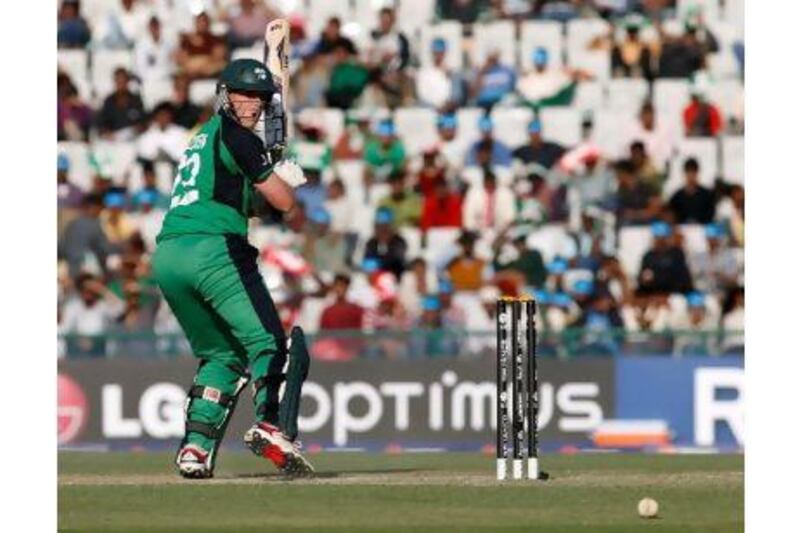Kevin O'Brien, Ireland's purple-haired destroyer who scored the fastest ever World Cup century in India last month, will probably never play in cricket's flagship event again.
The International Cricket Council (ICC) executive board, comprising mostly members from cricket's Test nations plus a few from outside that clique, has voted to exclude anyone other than their 10 full-member countries from the 2015 event. Meaning the likes of Ireland will not be there.
The Test nations have basically said: "It was nice to know you, Kevin. Now you have a story to tell fellow club cricketers — but don't embarrass us like that again."
__________________
More on cricket
• IPL needs to raise limit on foreign quotient
• Toe-crushing Malinga is aiming for the stars
• Pakistan are mining the fields to unearth cricket gems
__________________
The board has, however, acquiesced to the idea of outsiders being able to qualify for the World Cup from 2019 onwards. It will take eight years to phase in a one-day league. Who said the ICC can be slow to react?
The decision to cut the World Cup to 10 teams was a good one. Offsetting that by making space for six non-Test teams in the World Twenty20 was also the right thing to do.
But to then make the 50-over version a closed shop, with no route to qualify for anyone outside the privileged few, is ridiculous.
Imagine the grief Sepp Blatter would have been subjected to if Fifa, straight after the South Africa World Cup, said the next event was just going to be open to Brazil, Argentina, Spain, Italy, England, Germany, Sweden, Uruguay, Russia and Hungary.
No meritocracy or current form involved, of course. It is just because they are the ones who have been interested in football the longest and were good when it all started. And they are popular with advertisers.
Everyone else is entitled to play in some glorified five-a-sides between now and then, and they should count themselves lucky for that.
That is more or less what has happened in cricket, and it already looks ludicrous. Ireland are better ranked than Zimbabwe, yet will have to sit and watch the latter take their place next time around.
For some time now, Ireland have complained there is a glass ceiling stunting their progress. As of this week, make that reinforced, bulletproof glass which is so opaque it looks like concrete.
They had been pushing for Test status. Not only are they not getting that, but they are losing their greatest privileges besides. No wonder Warren Deutrom, the chief executive of Irish cricket, says he is "ashamed" to be associated with the ICC.
The hit is likely to be significant. Irish cricket has forever had to cope with the drift of their best players across the water to England.
Professionalism, via the county game has, boosted the standard of those Irishmen who have made the move, yet the very best have then been lost to the national team. Eoin Morgan, the Dublin-born batsman, is a proud Irishman. He was nearly moved to tears when Vincent Clerc scored a decisive last-minute try for France to beat the Irish rugby team in the 2007 Six Nations.
Back then he was touring the UAE as an Ireland player, but he did not need much coaxing to change his colours to England soon after.
England can offer Ashes cricket, regular television exposure, substantial wages and a shop window to the Indian Premier League. It is a no-brainer. Now that Ireland cannot even offer their players an appearance in a World Cup, there is virtually nothing to keep the best there.
And Ireland are not the only ones who will suffer. One of the most captivating tales in all of world sport in recent years has been the rise of Afghan cricket from the refugee camps to the world stage.
The core of players who starred in that narrative - which has already spawned one film and a soon-to-be-released book - were driven by the chance of playing in a World Cup one day. The next generation will be unable to dream such a dream.
The bizarre thing is the way the ICC have been so backward-looking in 50-over cricket, when they have proved to be perfectly capable of adapting to the T20 boom.
The sides who qualified for the last World Twenty20 - of which Afghanistan were one - did so a month in advance. For some reason, the 50-over qualifiers were decided two years earlier. That was plenty of time for some sides to advance and others to regress.
The Afghan advance has been so rapid that they would have been far better equipped to play at the World Cup than Kenya, Canada or the Netherlands.
That sums up the sloth-like administration of the 50-over game. They are still stuck in the blocks while progress is happening around them at a rapid rate.
Does it really take four years to implement a one-day league, which, we are told, will form the basis of qualifying for the 2019 event? If so, what relevance at all is there in the current one-day rankings?
Nil.
By creating a qualifying competition for the 2015 World Cup, 50-over internationals could have had some context.
Instead, for the next four years, they will be almost entirely inconsequential.






